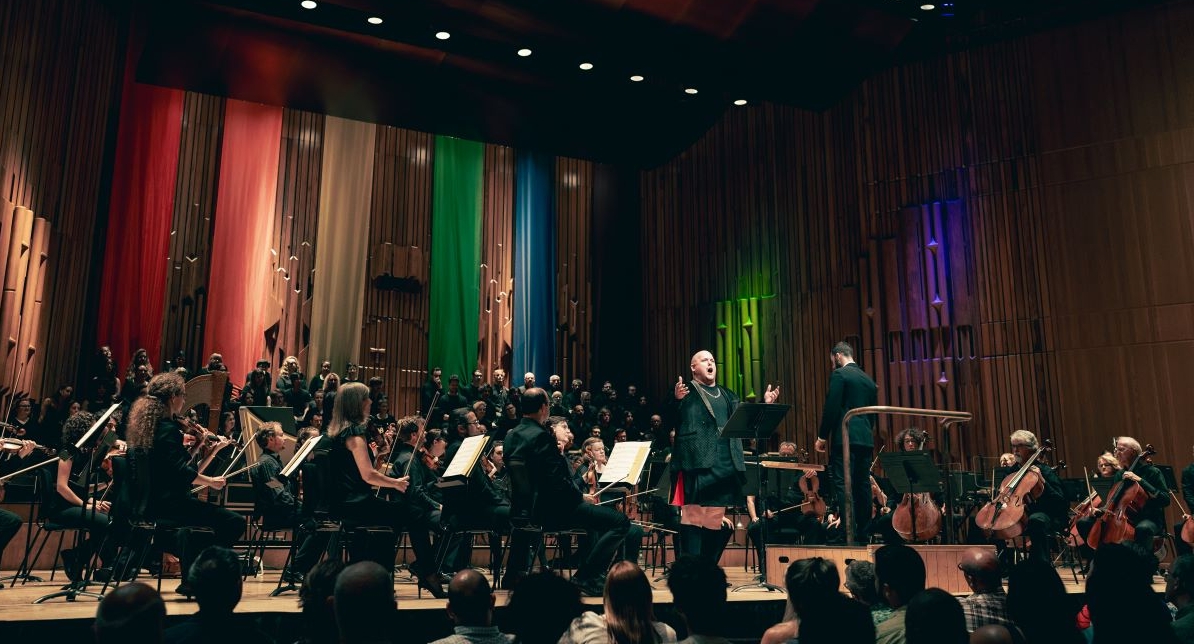Remarkably, this concert in the Barbican Hall was apparently the very first in which a leading orchestra participated front-and-centre with Pride celebrations. Given the acknowledged prominence of gay composers, conductors, singers and players in the history of classical music this is something of a surprise, but perhaps the prominence of parades and outdoor events in the previous development of Pride has simply delayed the incorporation of the concert hall too. In any case, all credit to entrepreneurial conductor Oliver Zeffman in curating and and devising this programme which blended the familiar and unfamiliar into a joyful evening which brought many new young audience members into a space where the average age is usually a lot higher.
We began with Bernstein’s busy and colourful overture to ‘Candide’, played at as fast a lick as I have heard it. The piece can certainly take that approach, but the performance would have benefited from a little more attention to the boundaries of dynamics to recreate the extra element of excitement that comes when you evoke its roots in Rossini and his ability to take a crescendo from the quietest beginning to a final explosion.
Next was a delightful performance of a work we hear all too rarely – Poulenc’s Concerto for Two Pianos. Here the orchestra was joined by the personal and professional partnership of Pavel Kolesnikov and Samson Tsoy. This is a piece of quicksilver moods of change – edgy interwar jazz, Mozartian pastiche and even gamelan-infused sections. The soloists and orchestra were all alert to the sharp transitions and ready with incisive shifts in emotional and technical dynamics. There was an interlude of heartstopping intimacy to follow in a Ravel encore played by the two soloists perched on the same stool, four hands intertwined.
Julian Anderson’s ‘Echoes’ set some demanding texts by Gerard Manley Hopkins. ‘The Leaden and Golden Echo’ is a poem full of pert and unexpected sprung rhythms typical of this poet, with a content devoted to the difficulty of cherishing, preserving and celebrating beauty given the fugitive nature of much of human experience. Anderson divides the text between a baritone soloist and choir, with multiple interwoven textures. The baritone line did not always come through clearly, though this is much more a comment on the acoustics in certain part of the hall rather than on the expertly graded tone of the soloist, Davone Tines. This is a subtle work that will repay repeated listening.
More readily accessible was the sequence of three songs by Caroline Shaw bearing the overall title of ‘Is a Rose’. Each song offered a commentary in a different style on the use of a rose a romantic symbol, sometimes using a familar poem such as Burns’ ‘Red, Red Rose’, and elsewhere poems by Shaw herself and Jacob Polley. Tines was joined by soprano Ella Taylor and Tenor Nicky Spence – the latter sporting a striking rainbow kilt! These songs came across very clearly in the context of delicate and imaginative orchestration, where a particular pleasure was the role of a harpsichord decorating the vocal line. You were reminded of the kind of skills that Britten pioneered in song setting where the voice is paired with several instruments in sequence to evoke very particular colours and moods.
The main business of the evening concluded with a full-blooded performance of Tchaikovsky’s symphonic poem ‘Romeo and Juliet’ with some wonderfully rich string sound and exciting percussive effects in the depictions of conflict and strife. Here Zeffman’s boldness with tempi really paid off, with the sharp contrasts in speeds adding to the drama and intensity released in the composer’s meditation on Shakespeare’s original. The audience much appreciated the final encore, an arrangement of the theme music from the currently iconic ‘White Lotus’ TV series.
Nick Grimshaw provided link material and continuity throughout the evening, which was highly necessary given the pauses for rearrangement of the stage and the numbers of individuals to be introduced, sponsors thanked, and tributes paid.
The specific legacy of this concert will lie with the funds raised for the Terrence Higgins Trust, Rainbow Railroad and Amplifund, but more generally it is to be hoped that remaining barriers between LGBTQ+ people and the world of classical music may come down and new awareness and appreciation on all sides will be enhanced. Perhaps this may become an annual feature in the Barbican’s calendar?

